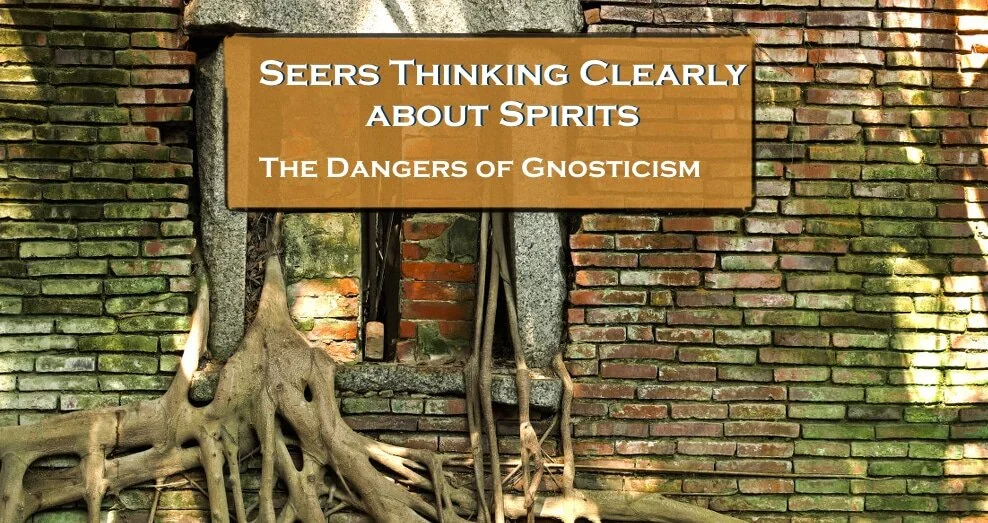Think Clearly about Spirits: Dangers of Gnosticism
One of the many challenges seers have is learning how to think clearly about spirits. They need a filter or a paradigm through which to interpret what it is they're seeing.
Discussions on the Forum
I've enjoyed reading and interacting in the Seers See Forum as seers wrestle with how to interpret what it is they're seeing. One issue came up that I wanted to address on the site, and that issue is the perspective most other websites have when dealing with supernatural things. Most websites that deal with the seeing ability will do so through errant filters, primarily through one of the many Gnostic mindsetsHere is an excerpt from my book Peace in Your House: Spiritual Cleansing of Life and Land, due out in a month or so. I deal with Gnosticism throughout the whole book, but in one of the chapters, I give a brief discussion.
The Dangers of Gnosticism
Gnosticism is a dangerous, insidious way of thinking that has slithered its way into the foundations of Western Civilization, and like a tree growing next to a house, the roots have ensured the future collapse of many social structures. Here's the excerpt:
Scientific materialism is not the only worldview that shapes our Western culture. Because scientific materialism presents a reality that is fundamentally opposed to what we as humans instinctively know and long for, many philosophical movements have arisen in reaction to scientific materialism. The most dominant perspective that has arisen in America is called Gnosticism.To understand Gnosticism, we need to consider the most influential non-Christian philosopher in Western civilization: Plato. He wrote during the time when the Old Testament was being compiled and has been so influential that “no man can discuss the relation of soul and body today without encountering some resurgence of the Platonic view.”[i]...to be sure, Plato’s conceptions of “soul” provide a valuable construct. But we should recognize, brilliant though he was, Plato was not a biblical writer, and he did not receive revelation from God about the nature of reality. Plato’s thinking is not necessarily biblical thinking.Plato, and not the Bible, developed the idea that the body is separate from the soul,...Plato asserted the soul existed before the body. In the mother’s womb, a soul was deposited in the new body. When the body dies, the soul was then released to go onto the next stage of the soul’s journey.Plato postulated that, although not evil, the body was a burden and a hindrance to the soul. The wise could cultivate the soul so that it would rise above the body and, at death, escape the earth and rise to the world above.This body-soul dualism is distinctly Platonic and not biblical, although Christians sometimes pick and choose verses of the Bible to support Plato’s ideas.In fact, the Bible is not rooted in Greek philosophy or Greek culture at all. It’s rooted in Hebraic thinking.This means we should not read and interpret scripture from the perspective of Greek or Western thinking, but from the thinking of the Hebrews.There is no trace of Plato’s dualism in the Bible and conceiving of humanity as three distinct parts (body, soul, and spirit) has little value from the Christian perspective.We will explore this later. For now, understand that biblically, “body, soul and spirit are not different, separate faculties of each person but different ways of viewing the whole person.”[ii]Humans exist in both the physical realm and the spiritual realm as complete beings......Different aspects of the complete human are operative in both realms at the same time.Still, Plato’s influence was so great that it impacted how many people read the Bible, and some of the later New Testament writers were responding to the invasion of Greek ideas into Christianity.Eventually this gave rise to Gnosticism in the centuries after Christ. In our last century, this paradigm has resurged in America and today is the dominant non-materialist view of reality in the United States and perhaps the rest of Western Civilization as well.Although some of the New Testament writers were specifically combating this Platonic invasion in Christian thinking, elements of Gnosticism have invaded and polluted many modern Christian practices and churches.It’s time to clean house, and the first step is to begin recognizing Gnostic thinking so we can purge it.Gnostics essentially hold the opposite view of materialists, in that it’s not the spiritual realm that is an illusion, but the physical realm.To Gnostics, the spiritual is the true reality. The spirit is pure and holy. The physical reality, especially the physical body, is dirty and evil to the core and should be destroyed, or at least, left behind.Gnostics also hold that God is not separate from the universe, but is one with the universe and humans should seek to transcend the physical to become “one with God” or to “achieve enlightenment” or “Christ consciousness” or the “next stage of evolution” (depending on the specific Gnostic persuasion).Ultimately, Gnostics want to shed the trappings of the wicked, dirty body in this physical, fallen earth, which is doomed to pass away in a cosmic fire anyway, and become purely spirit.Gnosticism is widely engrained in the thinking of modern Americans through the architects of culture, including Hollywood movies. In addition, aspects of Gnosticism are taught in Christian churches.But viewing reality through the lens of Gnosticism will not reveal an accurate interpretation of reality.
This post does not go into why the roots of Gnosticism undermine the fabric of society and churches. I just want you to begin recognizing Gnostic thinking and try to think differently about the world. We'll delve deeper later posts.Once you recognize Gnosticism, the question is, what is the best way to think about the world? Well, I do a deep dive in my book Peace in Your House. It's all about changing worldviews. This is the very essence of repentance: learning to think and act like God thinks and acts; donning the mind of Christ. For an overview, check out the worldview pages here.If you enjoyed this or would like updates on when the book is out, sign up for the newsletter.
[i] W.D. Lacey, “The Pauline View of Man”, 74, quoted by George Eldon Ladd, A Theology of the New Testament, Revised Edition (Grand Rapids, MI: Eerdmans, 1993), 500. The subsequent discussion on Plato comes from Ladd’s chapter, “The Pauline Psychology.”[ii] Ladd, Theology, 499, emphasis added.








